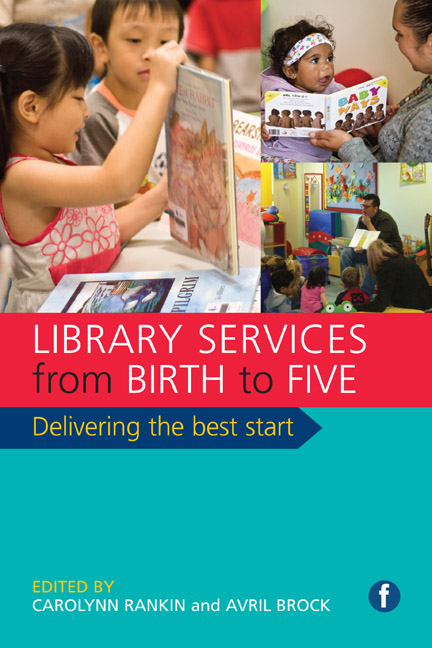Book contents
- Frontmatter
- Contents
- List of figures and tables
- Contributors
- Acknowledgements
- Introduction
- 1 Take them to the library: the pathway of opportunity
- 2 What you need to know about promoting early reading with young children from birth to five
- 3 Attribute value wrong, It should be `City of Literature ... it all starts with ABCD! The City of Melbourne and the Abecedarian Approach
- 4 Transforming practice through research: evaluating the Better Beginnings family literacy programme
- 5 People and partnerships, skills and knowledge
- 6 Resources for early years libraries: books, toys and other delights
- 7 Using digital media in early years library services
- 8 Using play to enhance early years literacy in babies and toddlers: ‘Read, Play and Grow’ at Brooklyn Public Library
- 9 Inclusive early literacy
- 10 Music and rhyme time sessions for the under-fives
- 11 Reaching your audience: the librarian's role
- 12 Successful library activities for the early years and ways to promote books effectively
- 13 Designing family-friendly libraries for the early years
- 14 Planning: organizing projects and money matters in the early years library
- Index
1 - Take them to the library: the pathway of opportunity
Published online by Cambridge University Press: 08 June 2018
- Frontmatter
- Contents
- List of figures and tables
- Contributors
- Acknowledgements
- Introduction
- 1 Take them to the library: the pathway of opportunity
- 2 What you need to know about promoting early reading with young children from birth to five
- 3 Attribute value wrong, It should be `City of Literature ... it all starts with ABCD! The City of Melbourne and the Abecedarian Approach
- 4 Transforming practice through research: evaluating the Better Beginnings family literacy programme
- 5 People and partnerships, skills and knowledge
- 6 Resources for early years libraries: books, toys and other delights
- 7 Using digital media in early years library services
- 8 Using play to enhance early years literacy in babies and toddlers: ‘Read, Play and Grow’ at Brooklyn Public Library
- 9 Inclusive early literacy
- 10 Music and rhyme time sessions for the under-fives
- 11 Reaching your audience: the librarian's role
- 12 Successful library activities for the early years and ways to promote books effectively
- 13 Designing family-friendly libraries for the early years
- 14 Planning: organizing projects and money matters in the early years library
- Index
Summary
PART 1 TAKE THEM TO THE LIBRARY: THE PATHWAY OF OPPORTUNITY
Introduction
Literacy and communication skills are vital in society today and an early introduction to literacy through a breadth of experiences of rhymes, stories, pictures and books supports these skills. Encouraging young children and their families to access a library, with all its resources, can provide a great foundation for developing early literacy. There are many routes into reading and practitioners – early years librarians, carers and educators – should capitalize on all of them. This introductory chapter will discuss literacy as a human right and the importance of early childhood as a time for becoming competent learners and readers.
Librarians know that reading to babies and young children is one of the most effective ways of enhancing language development in a child (Brock and Rankin, 2008; Greene, 1991; Walter, 2009). In terms of cognitive skills development, librarians have a contribution to make to the early years by providing activities that support the development of language, communication and literacy skills. Encouraging young children and their families to access a library and its resources can provide a great foundation for developing early reading skills (Anderson, 2006; Rankin, 2011; Rankin and Brock, 2008). This chapter will discuss the role of the public library and the role of the librarian in providing books and other resources and a place to access them.
Intervention and opportunity
The professional intervention provided by the librarian in supporting the development of communication, language and literacy is much more than just the ‘telling of stories’, as access is provided to resources that encourage emergent literacy and parents and carers are encouraged to play an active part in the learning process. The librarian provides positive interventions through an offer of universal services and by engaging in partnerships
We suggest that this intervention, or direct involvement, provides a pathway of opportunity for young children and their families if they take advantage of the library's services and resources. The term ‘intervention’ is used here to mean becoming directly involved in something in order to have an influence on what happens. In early years library sessions where children (and their families) are encouraged to participate the learning is interactive, experiential and social.
- Type
- Chapter
- Information
- Library Services from Birth to FiveDelivering the best start, pp. 1 - 30Publisher: FacetPrint publication year: 2019
- 1
- Cited by

